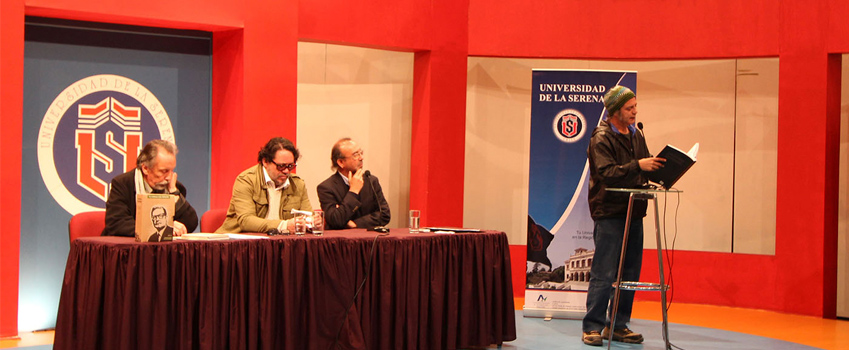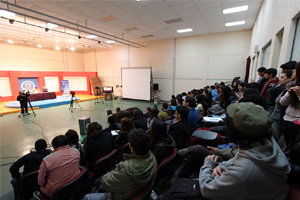- Culture and Extension
At the ULS they present the book ''Praise of the Bar: bars and poets of Chile''

Some of the writers included in the publication shared part of their verses with the attendees.
The Television Studio of the Journalism major at the University of La Serena was packed with people, during the presentation to the regional community of the book ''In Praise of the Bar: bars and poets of Chile'' (Editorial Etnika, 2014), published by the national poet Gonzalo Contreras and which contains nearly a hundred works, including poems and chronicles prepared by authors from all over the country.
The activity was organized by ULS academics, Drs. Francisco Roco and Walter Hoefler, along with the poet Jaime Retamales. The day had a massive presence of Pedagogy students in Spanish and Philosophy and Journalism from the higher education institution, as well as young people from other majors and the community in general.
After the presentations of the academics and the review of the work by Contreras, there was an interesting discussion with the attendees and the reading of some verses of the poems by the authors themselves from the Coquimbo Region, incorporated in the publication and who were present.
As Gonzalo Contreras explained, the intention of preparing this work ''is the rescue of a memory. Somehow, those chronicles, if they are not written, are lost. (…) In this case, I found that it was important for the artists themselves to write a testimony about their experiences with a place so transversal to our society (…). There are as many bars as there are patrons and, basically, each artist tells his experience, what he lived, what he imagines of what a bar is like as a poetic, mythical, utopian territory.'
 The reason why he decided to make this anthology, he points out, ''is very simple. The bar, in its most traditional conditions, practically disappeared. There must be some left, very few. And the other thing is that the poet, also in his most traditional characteristics, is practically extinct. Poets like Teillier, Cárdenas, Stella Díaz Varin, poets who could be said to be 'in their pure state', that poet has also disappeared. So they are two figures that in some way are in extinction. What I wanted was to rescue that memory and leave it as a heritage for future generations. It's like a tribute to those clubs that gave so much life and where first-rate cultural milestones were developed."
The reason why he decided to make this anthology, he points out, ''is very simple. The bar, in its most traditional conditions, practically disappeared. There must be some left, very few. And the other thing is that the poet, also in his most traditional characteristics, is practically extinct. Poets like Teillier, Cárdenas, Stella Díaz Varin, poets who could be said to be 'in their pure state', that poet has also disappeared. So they are two figures that in some way are in extinction. What I wanted was to rescue that memory and leave it as a heritage for future generations. It's like a tribute to those clubs that gave so much life and where first-rate cultural milestones were developed."
Despite the change of era and new customs, Contreras emphasizes that ''poetry continues its course. What disappeared was that universe, that remarkable imaginary that existed until the 70s, where it was a school. That was the bar. Far beyond going to have a drink, it was a school where one attended, could spend hours, in silence or participating. And one learned. It was a remarkable learning experience. One could afford not to go to a university. In fact, many writers did not go to university, they did not even have a fourth grade, but the intellectual training that these people had was from conversations in bars.
In this regard, he specifies that ''you couldn't come and sit at a table either, or, if you sat at that table, you had to listen and couldn't talk any nonsense, there were implicit demands that forced you to study and read to be up to date. height of these people who, evidently, had no pretensions, was absolutely natural. Now there is competition, who appears in the newspaper, the criticism, the award. There are poets who are not yet 50 years old and already want the national award, which seems absolutely idiotic to me. The poet changed his mind, now he is worried about the AFP, about an early retirement. Not before, they were people who lived practically in the abyss, but they lived with an intensity that was truly surprising and, obviously, I miss that a lot. And there this humble tribute is born."
Finally, Gonzalo Contreras declares that ''the bar is the ecumenical oasis par excellence. There is no religion, creed or ideology that has more followers who profess the goodness and virtues of this universal cult, where complex tolerance must admit, as the only possible currency, the complementarity of contradictory truths. Any conduct outside this scope has no destiny.
'''Praise of the Bar' fulfills in some way with that will, with that longing for communion that allows that unusual encounter of the sewing machine with the umbrella to finally take place in the bar, an encounter that is nothing other than a old love story that dates back to time immemorial. That's pretty much, in essence, what a bar could also be. The fraternal meeting of a utopia. In this case, tolerance among men, which is manifested of course in all the fundamental aspects of the human condition,'' the editor points out.
